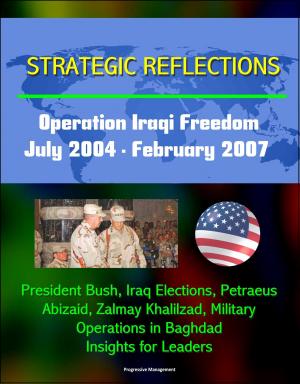The Special Operations Forces (SOF) Nutrition Guide - Warrior Athlete, Fueling the Human Weapon, Nutrient Timing, Healthy Snacking, Keeping Lean, Bulking Up, Combat Rations, Nutrition for Combat
Nonfiction, Health & Well Being, Medical, Patient Care, Nutrition, History, Military| Author: | Progressive Management | ISBN: | 9781310270819 |
| Publisher: | Progressive Management | Publication: | February 26, 2015 |
| Imprint: | Smashwords Edition | Language: | English |
| Author: | Progressive Management |
| ISBN: | 9781310270819 |
| Publisher: | Progressive Management |
| Publication: | February 26, 2015 |
| Imprint: | Smashwords Edition |
| Language: | English |
Special Operations Forces (SOF) are "Warrior Athletes," the ultimate athlete. The physical and mental demands imposed by SOF training and missions require appropriate nutritional habits and interventions so that, under the most rigorous conditions, performance is optimized, and health is preserved. Balancing the Energy Tank - Balancing energy intake and expenditure can be difficult when activity levels are very high and also when activity levels are very low, such as during isolation. Typically, body weight remains constant when energy intake equals expenditure. To lose or gain one pound of weight, 3,500 calories must be expended or consumed. Calculating Resting Energy Expenditure (REE) and the intensity of daily activities gives an accurate estimate of how much energy an operator might expend in one day. Fueling the Human Weapon - Carbohydrates (CHO) are the vital fuel for endurance and resistance activities, competitive athletic events, mental agility, and healthy living. Fats, the primary form of stored energy, are essential, but should be eaten in moderation. Proteins are essential for building and repairing body tissues; however, excess protein is converted to fat. High Performance Catalysts - Vitamin and mineral needs can be met by eating a variety of foods. Vitamin-mineral supplements do not provide energy. Vitamin-mineral supplementation is warranted only when energy balance is not met through the diet. Mega-dosing on vitamins and minerals can be detrimental to health and performance. Foods naturally high in antioxidants (fresh and colorful foods) should be eaten daily. Nutrient Timing and Training - The timing of nutrient delivery is critical to sustaining performance. The Refueling Interval (RFI) is the 45 minutes after finishing a workout. Eating during the RFI will accelerate recovery and restore energy for the next day's workout. A daily diet that is balanced and nutrient-dense will ensure better performance and optimal recovery. For exercise longer than 90 minutes, consume 50 grams of CHO and 12 grams of protein as food or drink immediately during the RFI and 50 grams of CHO every 2 hours for 6 hours. Adequate fluids must be ingested after a mission. Fluid replacement beverages should contain sodium and potassium. Sports bars, gels and drinks are lightweight, portable and easy to eat during SOF operations. Optimal Choices for Home Chow - Aim for as many servings of fruits and vegetables as possible. Optimal Choices for Eating Out - Not all restaurants are equal. Choose wisely. Eating out can be healthy if careful meal selections are made. Healthy Snacking - Snacking, or "eating between regular meals," is important to help maximize performance and maintain mental and physical acumen. Healthy snacks can help increase energy and alertness without promoting weight gain. Keep nutrient dense snacks at home, work, or "on the go." Snacks for night operations should include foods low in carbohydrate and high in protein. Snacks high in water, such as fruit, are great for warm weather operations. Snacks high in carbohydrate are good to consume when exercising in the cold. Secrets to Keeping Lean as a Fighting Machine - Consumption of carbohydrate (CHO) in defined amounts is the most important fuel strategy for all forms of exercise. CHO ingestion improves the use of amino acids when they are ingested together. Drinking too much plain water can pose performance pitfalls during prolonged missions/exercise sessions that involve constant movement. Bulking Up * Looking for the Edge-Dietary Supplements * Enemy Agents * Combat Rations * Eating Globally * Mission Nutrition for Combat Effectiveness * Returning to Home Base * The High Mileage SOF Warrior * Sustaining Health for the Long-Term Warrior
Special Operations Forces (SOF) are "Warrior Athletes," the ultimate athlete. The physical and mental demands imposed by SOF training and missions require appropriate nutritional habits and interventions so that, under the most rigorous conditions, performance is optimized, and health is preserved. Balancing the Energy Tank - Balancing energy intake and expenditure can be difficult when activity levels are very high and also when activity levels are very low, such as during isolation. Typically, body weight remains constant when energy intake equals expenditure. To lose or gain one pound of weight, 3,500 calories must be expended or consumed. Calculating Resting Energy Expenditure (REE) and the intensity of daily activities gives an accurate estimate of how much energy an operator might expend in one day. Fueling the Human Weapon - Carbohydrates (CHO) are the vital fuel for endurance and resistance activities, competitive athletic events, mental agility, and healthy living. Fats, the primary form of stored energy, are essential, but should be eaten in moderation. Proteins are essential for building and repairing body tissues; however, excess protein is converted to fat. High Performance Catalysts - Vitamin and mineral needs can be met by eating a variety of foods. Vitamin-mineral supplements do not provide energy. Vitamin-mineral supplementation is warranted only when energy balance is not met through the diet. Mega-dosing on vitamins and minerals can be detrimental to health and performance. Foods naturally high in antioxidants (fresh and colorful foods) should be eaten daily. Nutrient Timing and Training - The timing of nutrient delivery is critical to sustaining performance. The Refueling Interval (RFI) is the 45 minutes after finishing a workout. Eating during the RFI will accelerate recovery and restore energy for the next day's workout. A daily diet that is balanced and nutrient-dense will ensure better performance and optimal recovery. For exercise longer than 90 minutes, consume 50 grams of CHO and 12 grams of protein as food or drink immediately during the RFI and 50 grams of CHO every 2 hours for 6 hours. Adequate fluids must be ingested after a mission. Fluid replacement beverages should contain sodium and potassium. Sports bars, gels and drinks are lightweight, portable and easy to eat during SOF operations. Optimal Choices for Home Chow - Aim for as many servings of fruits and vegetables as possible. Optimal Choices for Eating Out - Not all restaurants are equal. Choose wisely. Eating out can be healthy if careful meal selections are made. Healthy Snacking - Snacking, or "eating between regular meals," is important to help maximize performance and maintain mental and physical acumen. Healthy snacks can help increase energy and alertness without promoting weight gain. Keep nutrient dense snacks at home, work, or "on the go." Snacks for night operations should include foods low in carbohydrate and high in protein. Snacks high in water, such as fruit, are great for warm weather operations. Snacks high in carbohydrate are good to consume when exercising in the cold. Secrets to Keeping Lean as a Fighting Machine - Consumption of carbohydrate (CHO) in defined amounts is the most important fuel strategy for all forms of exercise. CHO ingestion improves the use of amino acids when they are ingested together. Drinking too much plain water can pose performance pitfalls during prolonged missions/exercise sessions that involve constant movement. Bulking Up * Looking for the Edge-Dietary Supplements * Enemy Agents * Combat Rations * Eating Globally * Mission Nutrition for Combat Effectiveness * Returning to Home Base * The High Mileage SOF Warrior * Sustaining Health for the Long-Term Warrior















